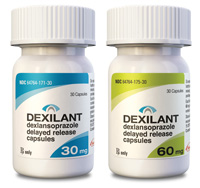Warnings & Recalls for Dexilant
General Warnings
The U.S. Food and Drug Administration approved safety labeling changes in March 2010 for Dexilant to include the risk of developing
immune system disorders such as Stevens-Johnsons syndrome (skin allergic reaction) or anaphylactic shock (serious allergic reaction) while taking this product.
The FDA has also issued warnings about the possibility of developing
clostridium difficile-associated diarrhea (CDAD) while taking proton-pump inhibitors such as Dexilant. Research also shows that proton-pump inhibitors may increase the risk of bone fractures. Patients most at risk for bone problems while taking Dexilant include persons who:
- are over 50 years old
- have a history of osteoporosis
- have taken Dexilant for an extended period of time or at high doses
Do not take Dexilant if you are allergic to dexlansoprazole and let your doctor know about any medical conditions you may have, especially:
- any allergies
- a history of liver damage or disease
- if you have low magnesium levels in your blood
- if you are pregnant or breastfeeding
Dexilant and Pregnancy
Dexilant is an
FDA pregnancy Category B medicine. When taken during pregnancy, Dexilant is
not expected to cause harm to the fetus. It is not known if Dexilant may harm a baby that is nursing. If you are
pregnant or
breastfeeding, be sure to talk to your doctor before using Dexilant as a treatment.
Dexilant Interactions
In May of 2012, the U.S. Food and Drug Administration issued a warning to alert patients of the risks of taking methotrexates with Dexilant. Combining these drugs can lead to methotrexate
toxicity in the body. Tell your healthcare provider about
all medicines you are taking, particularly:
- antibiotics and antifungals
- HIV or AIDS drugs
- medicines for heart disorders or disease
- iron supplements
- blood thinners or anti-diuretics
- medications for preventing transplant rejection
Dexilant Treatment and Use
Dexilant | Dexlansoprazole is a proton pump inhibitor medicine marketed by Takeda Pharmaceuticals for treating and reducing the side effects of gastroesophageal reflux disease (GERD). Dexilant may be prescribed to patients for the following:
- reducing acid in the esophagus
- aiding in the healing process of a damaged esophagus
- preventing acid reflux
Dexilant and other proton pump inhibitors may also be used for preventing and treating stomach ulcers or symptoms of Zollinger-Ellison syndrome.
How Does Dexilant Work?
Dexilant works by interacting with enzymes in the stomach that are responsible for creating acid. Dexilant interferes with the production of acid and reduces levels of acid which may have previously been harmful to the stomach lining or esophagus. Preventing further damage of these areas can allow them to heal properly.
How to Use Dexilant
Dexilant comes in long-acting capsule form to be taken by mouth daily in 60mg or 30mg doses. It is usually recommended that patients take Dexilant before a meal to reduce acid reflux after eating. Do not break or damage the capsule. If you have trouble swallowing the capsule, you may open the capsule and empty the contents into 1 tablespoon of soft food to be taken right away. Do not chew Dexilant.
Do not stop taking Dexilant as a treatment for your condition unless your doctor has directed you to do so.
